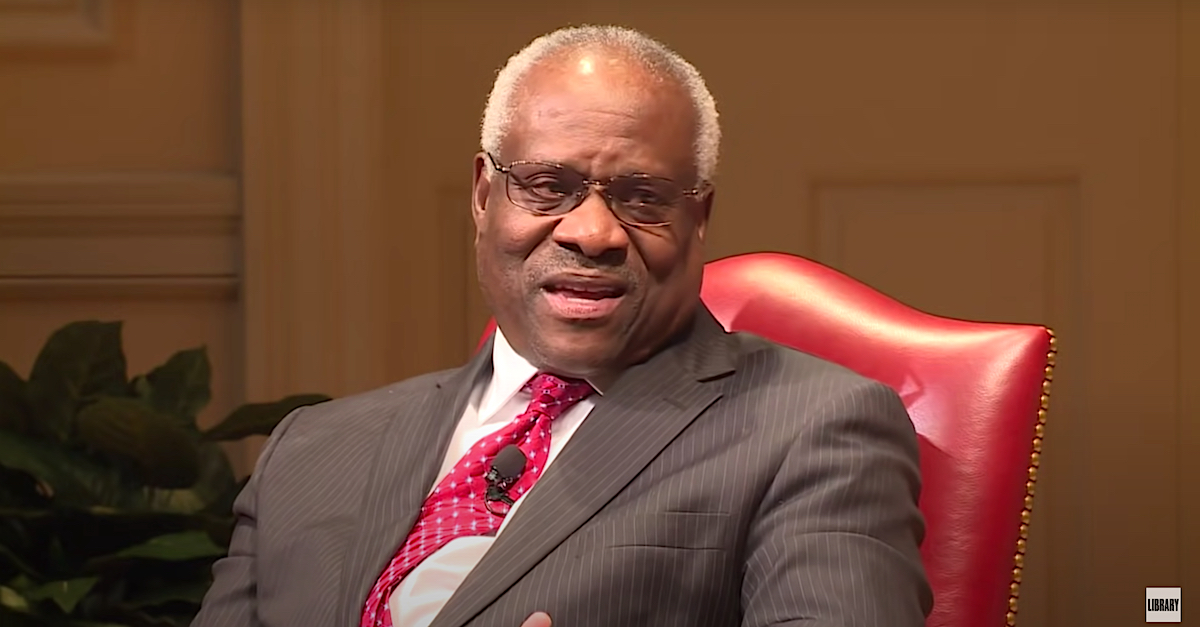
Clarence Thomas.
Over the fierce objections of state Democrats, Georgia’s Republican-controlled state senate voted to erect a statue of U.S. Supreme Court Justice Clarence Thomas on the state Capitol grounds.
SB 69, the bill that proposed the statue, was sponsored by Republican Sen. Ben Watson, whose district encompasses Pin Point, the town in the Savannah area where Thomas was born in 1948. The statue is to be funded by private donations.
In support of the bill, Watson said that Thomas’s life has been “marked by tremendous achievement,” and that the justice “deserves a place of honor and recognition” in which future generations can be inspired by Thomas’s accomplishments.
The Georgia state Senate voted 32-20 along party lines in favor of SB 69 on Tuesday. The bill next moves to the House for debate and if passed, will head to Gov. Brian Kemp (R) to sign into law. This is the second consecutive year the Georgia legislature has advanced the idea of honoring Thomas with a statue. In February 2022, the Senate passed SB 326 on the matter, but the bill did not make it to the floor for a House vote before the legislative session ended in April.
Democrats initially proposed an amendment to SB 69 to include an additional statute of civil rights leader and Georgia congressman John Lewis who died in 2020, but later retracted the proposal.
Thomas has long been a controversial figure, and opposition to honoring the justice at the state Capitol was fierce.
Democratic state Sen. Emanuel Jones railed against Thomas, calling him an “Uncle Tom” for “betraying his own community.”
Jones went on at length about the meaning he ascribed to the insult and said it referred to “a person who, back during the days of slavery, sold his soul to the slave masters.”
“When we think of a person in the Black community who is accomplished, but yet whose policies seek to subvert —some would even say suppress— the achievements and accomplishments of people of color, I couldn’t help but think about that term,” Jones said.
Jones did not specify what “policies” he meant, but his comments likely pointed to Thomas’s position in recent Supreme Court cases. Thomas has taken an overtly critical posture against affirmative action policies in college admissions, expressed opposition to same-sex marriage, advocated for the eradication of substantive due process rights, and joined the Court’s conservative majority to overrule Roe v. Wade.
Attorney and political commentator Elie Mystal responded to Jones’s “Uncle Tom” comments on Twitter, calling Thomas “more complicated” and “more tragic” than the fictional Harriet Beecher Stowe character.
Basically, I don’t think Thomas is just a stepping and fetching mouthpiece for his white masters.
He’s an independent thinker who happens to be wrong about everything and holds a dystopian, social Darwinist view of racial emancipation.— Elie Mystal (@ElieNYC) February 15, 2023
In addition to objections over Thomas’s jurisprudence, those opposed to the statue pointed to the justice’s personal life. Ginni Thomas, the justice’s wife, endorsed former president Donald Trump’s efforts to overturn the 2020 election and even attended a rally at the Capitol on Jan. 2, 2021. Long before that, Thomas faced scandal during his 1991 confirmation hearings over sexual harassment allegations raised by Anita Hill.
Clarence Thomas is the second Black Supreme Court justice in U.S. history and has served for three decades, thereby shaping American law for generations to come. Thomas was appointed by President George H.W. Bush to succeed Thurgood Marshall (the Court’s first Black justice). Thomas, the descendant of slaves, was born in rural Georgia and was raised by his grandparents and single mother in an impoverished family. He later attended the College of the Holy Cross and Yale Law School.
[Image via YouTube/Library of Congress.]